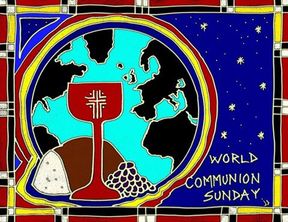
Freeport and Merrick
On World Communion Sunday, first celebrated by the Presbyterian Church back in 1937, we celebrate the diversity and oneness of the body of Christ. Yet we also acknowledge there are over 33,000 different denominations. Some churches are limited to members of a particular family. On the other hand the largest denomination contains well over a billion members. We acknowledge the hard work it takes to overcome our differences. However, we also acknowledge the stubborn splits that just won’t disappear. The infamous fights over the centuries characterized by insults, mutual excommunication, bloody battles, blood spilt, people tortured, imprisoned, burnt at the stake. All in the name of Christ. We may call this institutional divorce. Acrimonious institutional divorce, each side claiming ownership of the truth its opponents misguided, in error, and deserving a place in the lower realms of hell.
Today’s passage from Mark on divorce, falling on World Communion Sunday, seems bizarre. Uncalled for. Today we are here to embrace unity, not highlight separation. What worse timing for this text to fall on a day of celebration. Yet it is the breakdown in relationship, and our longing for repair that brought forth World Communion Sunday.
In Jesus’ time, divorce had become disturbing. Divorce was exclusively a man’s prerogative. A woman could not divorce her husband, but she could be sent away for the most frivolous of reasons. Initially a wife could be dismissed by her husband by a written decree of “indecency,” for adultery or immoral conduct. Over the years a husband could divorce his wife for any offense she gave him. She burnt his dinner. She raised her voice and the neighbor heard her. She left the house with her hair unbound. Men stood to gain everything while the spurned wife lost everything: her social standing, her right to raise and be with her children, her home and her future.
Jesus refuses to debate with the Pharisees on their ground. He challenges them to refocus on God’s vision and God’s intent: not on legalisms and loopholes. In a society that where marriage was the only institution for women and children’s economic security, Jesus refuses to allow women to be cast off for the slightest excuse. Instead, Jesus insists on lifting up God’s holy purposes for relationship: inclusion, union, relatedness, durability.
So today, on World Communion Sunday, we are reminded how easy it is for the powerful to exclude and to claim a monopoly on grace or knowledge. The powerful still get their way and turn a blind eye to truth. World Communion Sunday calls us to forgo exclusivity and power plays, and embrace inclusion, union, relatedness, durability.
The divorce dilemma of our text has been used to exclude those broken by divorce from the Communion Table. World Communion Sunday acknowledges and celebrates the variety of denominations, cultures, ethnicities, traditions, sexual orientations, nationalities, genders all made one in Christ Jesus our Lord. In our brokenness, we find hope in Christ.
Our Brokenness is a reality. I am a divorced woman. I failed at my first marriage. Each one of us can name a breach in a relationship – from an infidelity, to bickering and bitterness, making fun of somebody, a sharp word, a stingy attitude. We are broken on the inside by pain, grief, regret, mistakes we can’t take back. We are broken in our world: our politics are more polarized than ever. The gap between rich and poor has never been wider. Our planet is broken by war, pollution and natural disasters. Faith seems fractured. The battle lines are drawn. Yet in this reality of sinful brokenness, we are given good news.
According to Hebrews, Jesus, the perfect image of God, sustains all things for us, and made that purification of sins. Listen to this at v.11, it says that Jesus is not ashamed to call us brothers and sisters. Despite all we’ve done. Where we’ve been. Where we are. that gives hope.
The passage from Mark doesn’t end with the words of separation and conflict of the Pharisees. It turns to Jesus’s words of welcome for the little ones, which Jesus has been guiding us to see for the past several weeks of gospel readings. “Let the little children come to me; do not stop them; for it is to such as these that the kingdom of God belongs. Truly I tell you, whoever does not receive the kingdom of God as a little child will never enter it.” And he took them up in his arms, laid his hands on them, and blessed them.
Our salvation lies in this. Jesus knows we are a broken people. Yet we come to him nonetheless. With the truth of little children. Trusting that no matter who we are, what we have done, our goal is to be with Jesus. That’s all Jesus wants us to know: we are loved. We are forgiven. That’s all we need to know and that’s all it takes.
Today as we come to the table, each one of us has a heart that potentially be divided by a number of issues. As we examine our lives, we can think of what divides us, what breaks us apart inside and out. But for all that leaves us broken, that does not have the final say. Jesus says, come. Learn to enter the kingdom of Heaven like a little child, with trust, hope, and openness. That is the blessing.
May we learn this World Communion Sunday we are a people broken and blessed. We are worthy, for the kingdom of God because we follow the example of the little children, open, reaching for Jesus, welcomed by him as his brothers and sisters that no divorce, no separation, no division, can destroy. Let us some together to the table, cuts, bruises divisions and all, and know confidently, in the arms of Jesus, we are healed and blessed. Amen.
 RSS Feed
RSS Feed